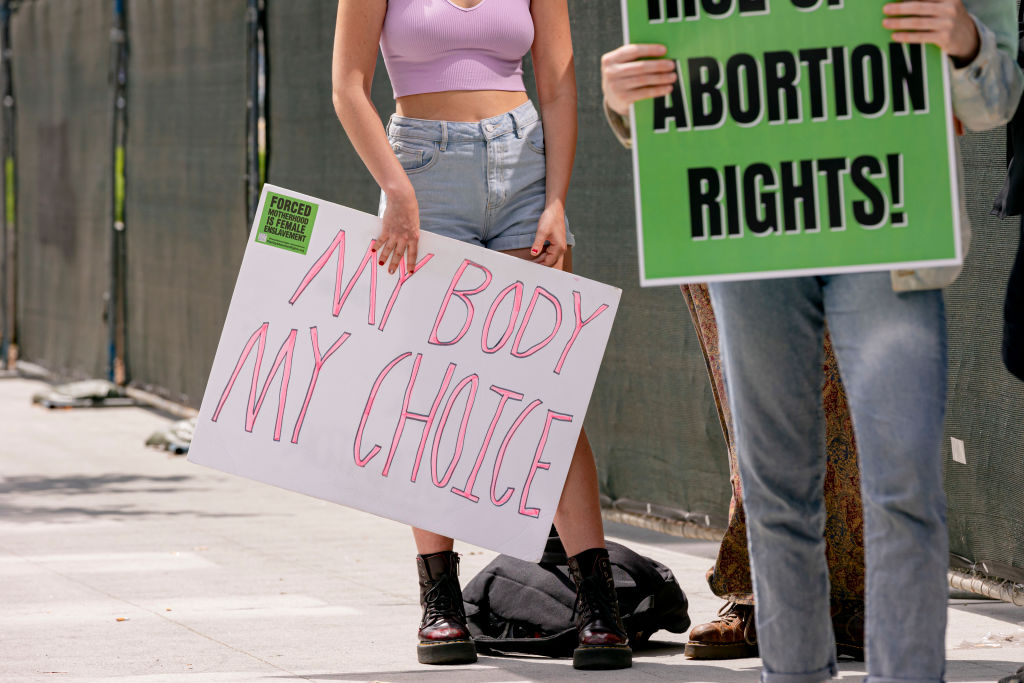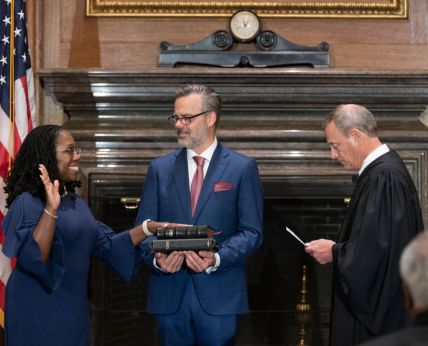The disturbing link between slavery and the overturning of Roe v. Wade
OPINION: Allowing states to make autonomous decisions over a woman’s body is a frightening step back toward the era of bondage that nearly aborted our national democratic experience.

Editor’s note: The following article is an op-ed, and the views expressed are the author’s own. Read more opinions on theGrio.
With the recent majority opinion in Dobbs v. Jackson, the Supreme Court overturned Roe v. Wade and Casey v. Planned Parenthood, asserting that a state could determine a woman’s access to an abortion. The decision, penned by Justice Samuel Alito, argued that the Due Process Clause—the basis on which Roe was upheld for 50 years—does not apply to abortion as it has no rooting in America’s national history or culture and, thus, cannot be interpreted as an unenumerated right. According to the high court, states should have the right to determine a woman’s legal access to an abortion based on a state’s own interest.
Disturbingly, such “states’ rights” ideology should sound familiar given it is the same argument used by pro-slavery politicians of the 19th century to perpetuate the bondage of its darker citizens. While the Constitution does leave many decisions to state legislatures, it is fundamentally unfair to allow states to make autonomous decisions over a woman’s body.
In America, our law determines that some rights are so fundamental that they should not be left to the varied politics of individual states given it would tear at the fabric of our nation’s democratic ideals. Freedom from bondage, ultimately codified by the 13th Amendment in 1865, is one such right. The amendment—which establishes that “Neither slavery nor involuntary servitude, except as a punishment for crime whereof the party shall have been duly convicted, shall exist within the United States, or any place subject to their jurisdiction”—is constitutionally unique in imposing a complete bar of slavery because the institution conflicted with other constitutional provisions. Such a unique legal measure was required to ensure that freedom from enslavement was fully enforced and not left to the whims of individual states, particularly given the pre-secession, legislative influence of southern, plantation-based economies.
The freedom to make autonomous decisions over a woman’s own body is another fundamental right that should not be left to the varied politics of individual states. While most abortion debates philosophically consider if a fetus is a full human being, some, like Medium blogger Elle Beau in her May 2019 piece, promote that “existing precedents around body autonomy are infinitely more important” given they are a “critical component of the right to privacy protected by the Constitution.” With a body of applicable case law including Griswold v. Connecticut (1965), McFall v. Shimp (1978), and, until recently, Roe v. Wade (1973), the Supreme Court had ruled and maintained that “competent adults have the right to refuse medical treatment if they so wish; that consenting adults have the right to engage in whatever sexual practices they wish; and that under the due process clause of the 14th Amendment women may terminate their pregnancies before such time as the fetus is viable outside the womb.”
Such rulings were necessary to clarify democratic norms, particularly in the case of early-term abortion which, contrary to public opinion, was far from uncommon in American history given its accepted herbal practice dating back to the colonial period. It wasn’t until the 19th century that Victorian-era mores set in and, by the early 20th century, abortion—outside of cases threatening the mother’s life—was a criminal procedure in almost every state. Along with the changing social norms of the day, this was in large part due to a male-dominated effort to reign in increasingly independent-minded women; an ongoing attempt by American physicians to marginalize nonmainstream and more sympathetic medical practitioners like homeopaths and midwives; and, increasing concerns over the low birthrate for affluent whites in the face of the country’s shifting ethnic and racial dynamics.
The criminalizing of the procedure would continue to rise until 1973 as many states had abortion bans in place. Upon the landmark Roe decision—brought on by years of advocacy around women’s reproductive health rights and outrage over the thousands of botched illegal abortions occurring annually—most states repealed their abortion bans as the ruling made them unenforceable. Nonetheless, some states never actually repealed their pre-Roe abortion bans and, given the recent ruling, they will likely revive them.
Make no mistake, the overturning of Roe v. Wade is both a travesty and a tragedy for women, our country, our Constitution, and our democracy. Specious or politically opportunistic arguments for states’ rights should have no bearing on the freedom to make autonomous decisions over one’s own body. For Texas to set different abortion laws than California is not only anti-choice, it is anti-freedom.
For, ultimately, our unique American experience is supposed to be most defined by our freedom. And leaving something as fundamental as autonomy over one’s body to the whims of state politics is a frightening step back toward the era of bondage that nearly aborted our national democratic experience in the first place.

Stephanie Robinson, Esq. is a lecturer on law at Harvard Law School where she teaches on issues of democracy, media, and race, and their intersections with the law. She is the president of Sly Bear Media Group. She is the former chief counsel to Senator Edward M. Kennedy and was a political and social commentator for “The Tom Joyner Morning Show,” offering her perspective weekly to over 10 million people on the day’s most pressing issues.
TheGrio is FREE on your TV via Apple TV, Amazon Fire, Roku, and Android TV. Please download theGrio mobile apps today!


